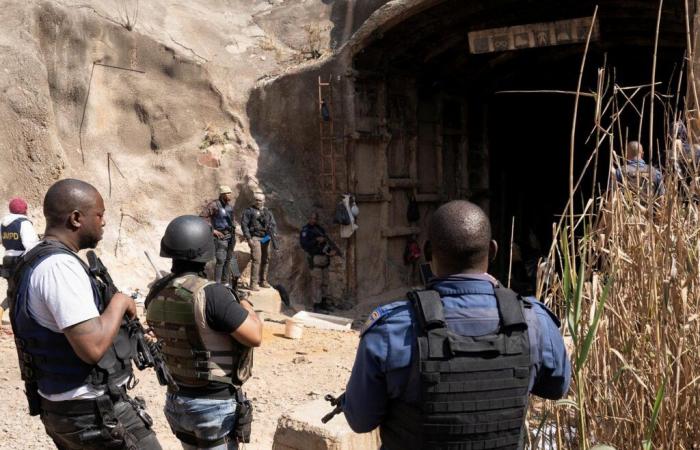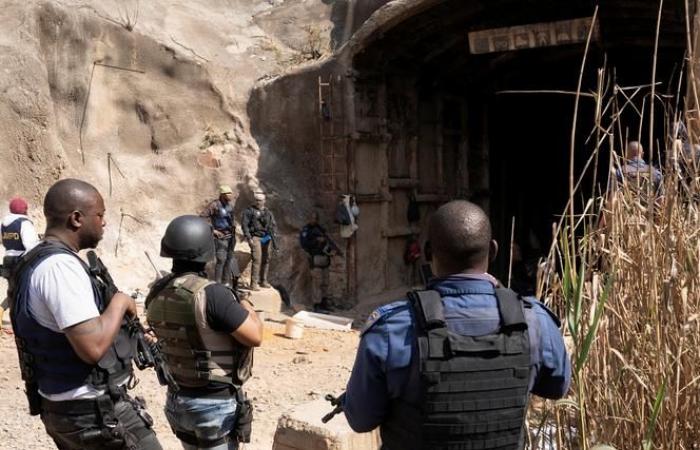It’s a suffocating face-to-face encounter. According to residents of Stilfontein, in South Africa's North West Province, more than 4,000 illegal miners are believed to be “stuck” underground, surrounded by the police, who cut off their supplies to force them to come back up and arrest them. Thursday November 14, a lifeless body was brought to the surface by volunteers while the police refused to risk going down into the disused mine.
The maneuver is part of a vast strike operation launched by the South African authorities in December 2023 against the illegal exploitation of some 6,000 disused mines which dot the territory. Operation Vala Umgodi (“Plug the holes”in the Nguni language) has seen a boost in recent weeks in the North-West province.
Read also | In South Africa, the army mobilized to fight against illegal mining activities
Read later
Since October 18, 1,000 illegal miners have been forced to resurface before being “picked” by the police who crisscross the countryside to cut the supply chains necessary for these men, who sometimes remain underground for months. On November 2, in a press release, the police welcomed the surrender of more than 200 minors, “consequence of hunger and thirst”.
“We are going to suffocate them”
A harshness assumed by the government. Questioned during a press conference on Wednesday, November 13, the Minister Delegate to the Presidency, Khumbudzo Ntshavheni, burst out laughing in response to a journalist's question who asked her if the authorities were considering sending help to miners trapped in Stilfontein. “You want us to send help to criminals, honestly? We will not send them aid. We're going to suffocate them, they're going to come back up. Criminals should not receive help, they should be persecuted”hit Mme Bloody blood.
The day before, the authorities had finally agreed to let volunteers drop off water and food after being alerted to the precariousness of the situation at the bottom of the mine by a resident sent to “reconnaissance mission”. “He came back explaining that there were more than 4,000 people underground and several bodies. He told us that the people were so weak that they could not pull themselves up using ropes like they usually do. For this reason, we have decided to authorize [des volontaires] to give them a little help, so that they regain their strength and can go out, nothing more”explains Brigadier Sabata Mokgwabone, police spokesperson for the North West province.
Also read (2019) | In South Africa, the mining industry is a “dinosaur on the verge of extinction”
Read later
Since volunteers have been allowed to interact with miners, five men have agreed to be brought to the surface. Very weak, they were taken care of by medical teams. According to local media, the miners, who refused to return when faced with the prospect of being arrested, would now demand that the weakest be rescued and that the bodies of the dead be brought back before agreeing to surrender.
“Inhumane and irresponsible”
Thursday, November 14, the spokesperson for the North West police was not able to confirm this claim, but Khumbudzo Ntshavheni has already made it known that the police will not go looking for anyone, dead or alive. “It’s not our job to bring back the bodies of criminals”coldly explained the Minister Delegate to the Presidency.
Words “inhumane and irresponsible”according to Phillip Mankge, the deputy general secretary of the National Union of Mineworkers, a miners' union. “Our position is that artisanal mining must be regulated so that illegal miners can work legally and pay taxesdetails at Monde union spokesperson Livhuwani Mammburu. What worries us is that the authorities seem to be targeting poor black miners while the Chinese organize the illegal exploitation of certain chrome mines without being worried. »
Read the decryption | Article reserved for our subscribers China is banking on Africa to reshape the world order
Read later
Questioned by the South African television channel Newzroom Afrika, the president of another union, the Association of Mineworkers and Construction Union, Joseph Mathunjwa, drew a parallel between the current situation and the tragedy of Marikana, in 2012, in during which thirty-four miners were killed by the police, who opened fire on hundreds of strikers in the same North-West province. Not all South Africans share this view. Many are hostile to these illegal miners, often illegal migrants from neighboring Lesotho or Mozambique, whom they accuse of plundering the South African subsoil and terrorizing local communities.







